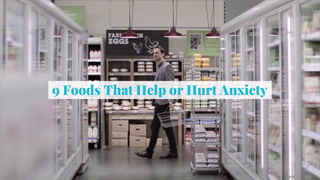9 Foods That May Help or Hurt Anxiety

9 Foods That Help or Hurt Anxiety

Next up video playing in 10 seconds
Your diet cannot cure anxiety. But if you experience stress that results in anxiety or panic attacks, making some modifications to your diet may give some relief.
Check out the following five foods you may want to add to your diet to ease anxiety, and four foods you may want to avoid because they can increase it.
1. Foods to Eat: Turkey and Tryptophan-Rich Foods
“Tryptophan is a precursor to serotonin, and serotonin, a neurotransmitter, helps you feel calm,” says Manuel Villacorta, RD, founder of MV Nutrition in San Francisco.
“With the majority of serotonin being produced in the gut, what we eat (and don't) can have a direct impact on mood (anxiety, depression),” says Angel Ortiz, a licensed marriage and family therapist in Elk Grove, California.
- Turkey
- Chicken
- Fish
- Egg whites
- Milk
- Cheese
- Soy
- Peanuts
- Sesame seeds
2. Foods to Eat: Beef and Foods Rich in B Vitamins
- Beef
- Poultry
- Fish
- Pork
- Spinach
- Eggs
3. Foods to Eat: Whole Wheat Bread and Other Complex Carbs
When choosing carbs, go for whole grains, such as whole-wheat bread or brown rice, rather than processed choices, such as sugar, candy, or even white bread and white rice, Villacorta says. That’s because processed foods may have the opposite effect and worsen anxiety (more on that later).
4. Foods to Eat: Omega-3-Rich Foods, Like Salmon
5. Foods to Eat: Greek Yogurt and Other High-Protein Foods
- Greek yogurt
- Fish
- Lean meats
- Cheese
- Eggs
- Nuts
- Beans
- Soy
- Lentils
The ideal for lessening anxiety and boosting mood, says Villacorta: “Combine complex carbohydrates and protein, and spread your meals throughout the day.”
6. Foods to Limit: Coffee and Caffeinated Drinks
Some people drink coffee and other beverages that contain caffeine (such as tea and cola) to help boost their energy levels, but these should be limited or avoided if you want to tamp down anxiety, says Ortiz.
7. Foods to Limit: Candy, Sweets, and Added Sugars
Of course, many people like sweets. And sweets, including those containing table sugar, honey, and corn syrup, can make us feel better — but again, it’s only a temporary lift.
8. Foods to Limit: Alcohol
If you do drink, drink in moderation. “If you have a 6-ounce glass of wine at dinner, it’s probably fine,” Villacorta says. “But you don’t want to be a heavy drinker, finishing off a few bottles with your meal.”
9. Foods to Limit: Hot Dogs and Other Processed Foods
It’s best for your mental health to limit or skip the processed foods, says Villacorta.
Instead of reaching for a highly processed snack or meal, replace these options with healthier ones, says Ortiz.
“A good rule of thumb is to imagine filling your plate with 50 percent vegetables and fruits, 25 percent complex carbohydrates (brown rice, quinoa, whole-grain bread), and 25 percent lean protein (chicken breast, fish, salmon) to reduce inflammation, improve brain health, and foster neurotransmitter production,” he says.
The Takeaway
- The nutrients in some foods can elevate or ease anxiety.
- For fewer anxiety symptoms, try to eat foods with tryptophan, vitamin B, complex carbs, omega-3 fats, and protein.
- Avoid foods and drinks like candy, alcohol, and caffeinated beverages to help manage anxiety.
Resources We Trust
- Mayo Clinic: Coping With Anxiety: Can Diet Make a Difference?
- Cleveland Clinic: De-Stress Eating: Foods to Help Reduce Anxiety
- Harvard Medical School: Nutritional Strategies to Ease Anxiety
- American Society for Nutrition: Nutrition and Stress: A Two-Way Street
- American Psychiatric Association: How to Boost Mental Health Through Better Nutrition
Additional reporting by Abby McCoy.
- Coping With Anxiety: Can Diet Make a Difference? Mayo Clinic. December 17, 2024.
- Bistas KG et al. The Benefits of Prebiotics and Probiotics on Mental Health. Cureus. August 2023.
- Tryptophan. MedlinePlus. May 4, 2024.
- Kuhn DM et al. Tryptophan Brain Level. Handbook of Behavioral Neuroscience. 2020.
- Mahdavifar B et al. Dietary intake of B vitamins and their association with depression, anxiety, and stress symptoms: A cross-sectional, population-based survey. Journal of Affective Disorders. June 2021.
- B vitamins and folic acid. National Health Service. August 3, 2020.
- Benton D et al. Carbohydrate and Sleep: An Evaluation of Putative Mechanisms. Frontiers in Nutrition. September 2022.
- Are you getting enough omega-3 fatty acids? American Heart Association. June 30, 2023.
- Natacci L et al. Omega 3 Consumption and Anxiety Disorders: A Cross-Sectional Analysis of the Brazilian Longitudinal Study of Adult Health (ELSA-Brasil). Nutrients. May 24, 2018.
- Hert MD et al. The intriguing relationship between coronary heart disease and mental disorders. Dialogues in Clinical Neuroscience. March 2018.
- Gasmi A et al. Neurotransmitters Regulation and Food Intake: The Role of Dietary Sources in Neurotransmission. Molecules. December 2022.
- Kuo H et al. Noradrenergic Enhancement of Motor Learning, Attention, and Working Memory in Humans. International Journal of Neuropsychopharmacology. February 2021.
- Reyes-Vasquez C et al. Dopamine, Norepinephrine and Serotonin Participate Differently in Methylphenidate Action in Concomitant Behavioral and Ventral Tegmental Area, Locus Coeruleus and Dorsal Raphe Neuronal Study in Young Rats. International Journal of Molecular Sciences. November 2023.
- Restivo J. High-Protein Foods: The Best Protein Sources to Include in a Healthy Diet. Harvard Health. December 1, 2023.
- Galen KA et al. Serotonin, Food Intake, and Obesity. Obesity Reviews. February 2021.
- Ohta R et al. Serotonin Syndrome Triggered by Overuse of Caffeine and Complicated With Neuroleptic Malignant Syndrome: A Case Report. Cureus. February 2022.
- Serotonin. Cleveland Clinic. March 18, 2022.
- Liu C et al. Caffeine Intake and Anxiety: A Meta-Analysis. Frontiers in Psychology. January 31, 2024.
- Anxiety and Sleep. Sleep Foundation. April 23, 2024.
- Carbohydrates and Blood Sugar. The Nutrition Source.
- Wang X et al. The Relationship Between Dietary Sugar Consumption and Anxiety Disorders: A Systematic Review. Nutrition Bulletin. August 2024.
- Alcohol Use and Your Health. Centers for Disease Control and Prevention. January 14, 2025.
- Lane MM et al. Ultra-Processed Food Consumption and Mental Health: A Systematic Review and Meta-Analysis of Observational Studies. Nutrients. June 2022.

Reyna Franco, RDN
Medical Reviewer
Reyna Franco, RDN, is a New York City–based dietitian-nutritionist, certified specialist in sports dietetics, and certified personal trainer. She is a diplomate of the American College of Lifestyle Medicine and has a master's degree in nutrition and exercise physiology from Columbia University.
In her private practice, she provides medical nutrition therapy for weight management, sports nutrition, diabetes, cardiac disease, renal disease, gastrointestinal disorders, cancer, food allergies, eating disorders, and childhood nutrition. To serve her diverse patients, she demonstrates cultural sensitivity and knowledge of customary food practices. She applies the tenets of lifestyle medicine to reduce the risk of chronic disease and improve health outcomes for her patients.
Franco is also a corporate wellness consultant who conducts wellness counseling and seminars for organizations of every size. She taught sports nutrition to medical students at the Albert Einstein College of Medicine, taught life cycle nutrition and nutrition counseling to undergraduate students at LaGuardia Community College, and precepts nutrition students and interns. She created the sports nutrition rotation for the New York Distance Dietetic Internship program.
She is the chair of the American College of Lifestyle Medicine's Registered Dietitian-Nutritionist Member Interest Group. She is also the treasurer and secretary of the New York State Academy of Nutrition and Dietetics, having previously served in many other leadership roles for the organization, including as past president, awards committee chair, and grant committee chair, among others. She is active in the local Greater New York Dietetic Association and Long Island Academy of Nutrition and Dietetics, too.

Beth W. Orenstein
Author
Beth W. Orenstein is a freelance writer for HealthDay, Radiology Today, the Living Well section of The American Legion Magazine, St. Luke’s University Health Network, and others. She is a magna cum laude graduate of Tufts University (1978), where she majored in English and was editor of the student newspaper for three years.
No matter the weather around her eastern Pennsylvania home, Orenstein either bikes 25 to 30 miles or walks at least 6 miles every day. Her one indulgence is blueberry pancakes — but only after biking a long distance.